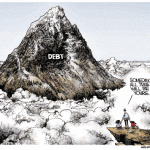It now seems like the U.S. might be getting closer to acknowledging that it has a serious fiscal problem, At least this is what one might infer from the strong support from Congressmen and Senators from both sides of the aisle, thousands of business leaders and economists from all stripes, as well as from fifteen Nobel Laureates in Economics, for a new bill called the Intergenerational Financial Obligations Reform Act or “Inform Act” – in spite of the fact that the proposal is being totally ignored by the mainstream media and, as evidenced by the case of Detroit, the longer we wait, the worse it gets.
one might infer from the strong support from Congressmen and Senators from both sides of the aisle, thousands of business leaders and economists from all stripes, as well as from fifteen Nobel Laureates in Economics, for a new bill called the Intergenerational Financial Obligations Reform Act or “Inform Act” – in spite of the fact that the proposal is being totally ignored by the mainstream media and, as evidenced by the case of Detroit, the longer we wait, the worse it gets.
So say Eric Sprott and Etienne Bordeleau (sprott.com) in edited excerpts from their original article* entitled Inform Act.
[The following is presented by Lorimer Wilson, editor of www.FinancialArticleSummariesToday.com and www.munKNEE.com and the FREE Market Intelligence Report newsletter (sample here – register here). The excerpts may have been edited ([ ]), abridged (…) and/or reformatted (some sub-titles and bold/italics emphases) for the sake of clarity and brevity to ensure a fast and easy read. This paragraph must be included in any article re-posting to avoid copyright infringement.]
Sprott and Bordeleau go on to say in further edited excerpts:
The perpetual underlying issue is that governments promise too much, then borrow to try to keep up, but, given the scale of the promises relative to their means, inevitably have to renege on those promises. This creates a situation where ordinary citizens are fooled into thinking that the government will provide for them ad infinitum (forever), and as a result do not save enough and consume too much. [As such, ] we find it appalling that…the “Inform Act” completely flew under the radar of the mainstream media. Hopefully, if this becomes law, it will not be possible for people to keep their head in the sand on fiscal responsibility.
The “Inform Act”, as initiated by Boston University’s Larry Kotlikoff, is a bi-partisan bill that was introduced in the Senate and that will be introduced shortly in the House of Representatives that would require that the:
- “Congressional Budget Office (CBO), the General Accountability Office (GAO), and the Office of Management and Budget (OMB)
- to do fiscal gap accounting and generational accounting on an annual basis and, upon request by Congress,
- to use these accounting methods to evaluate major proposed changes in fiscal legislation.
In other words, it would require the U.S. government to evaluate its budget deficit by estimating the net present value of all its future payments and receipts, instead of arbitrarily deciding which items make it to the budget or not, as is currently the case. Thus, fiscal gap accounting would better represent the present and future liabilities of the government to its citizens and, as the thinking goes, allow for better decision making.
While not perfect, fiscal gap accounting is a huge improvement to the current system of “cash deficit accounting”, which ignores most future obligations the government has and henceforth prevents any meaningful discussion of issues before they occur (i.e. prevents the government from being proactive)…
Another benefit of this method is that it takes into account not just current U.S. citizens but their offspring as well. While it is not politically very rewarding (for obvious reasons), taking into account future generations of taxpayers makes perfect sense when designing multi-generational policies such as social security, medical care and environmental policy. A failure to consider the future impact of policies is most likely what put the U.S. public finances in such a bad shape in the first place.
The direness of the situation is quite obvious in Figure 1 below, which shows the difference between expected spending and revenues, as calculated by the Congressional Budget Office (CBO), and which is also the basis for the calculation of the fiscal gap. While Washington congratulates itself for its slight forecasted decline over the next few years, it should re-accelerate…[considerably] afterwards if no change is made to future commitments. This is why the Inform Act is so important; it forces politicians to focus on the longer term, not the next few years until re-election.
Figure 1: Total Federal Government Deficit (Spending minus revenues) – Constant 2013 Billion

Source: CBO Long-Term Budget Outlook & Sprott Calculations
…Chronic underfunding of future liabilities is a broad problem which affects corporations, municipalities and states as well. Unfortunately, those issues are ignored by the mainstream media until, as in the case of Detroit, it is already too late. As a result, most citizens remain uninformed about the unsustainability of the income or benefits they receive and cannot plan accordingly.
The case of Detroit should not be brushed off as an anomaly but rather should be viewed as a template for what will happen if the government continues to over-promise relative to its means. As calculated by Professor Kotlikoff, the current fiscal gap is about $222 trillion and closing it would require either a permanent tax increase of 64% or a 40% reduction in all expenditures. Clearly, this cannot end well.
Conclusion
The “Inform Act” is only a first step in the right direction, however, as simply acknowledging the extent of fiscal unsustainability does nothing to remedy the problem. The real pain will come when pensioners see their benefits cut or, alternatively, when the ever shrinking workforce has to contribute more in the form of higher taxes. [As such, it behooves] the mainstream media not to ignore the “Inform Act” and to inform the populace about the true state of U.S. fiscal affairs and the important issues the Act is attempting to address.
For more information on the “Inform Act”, please visit: http://www.theinformact.org/
figure 2: Nobel Laureates supporting the Inform Act
| Name | Affiliation |
| Dale Mortensen | Northwestern University |
| Edmund Phelps | Columbia University |
| Eric Maskin | Harvard University |
| Finn E. Kydland | University of California at Santa Barbara |
| Harry Markowitz | University of California at San Diego |
| James Heckman | University of Chicago |
| Kenneth Arrow | Stanford University |
| Oliver Williamson | University of California at Berkeley |
| Robert Engle | New York University |
| Robert Lucas | University of Chicago |
| Roger Myerson | University of Chicago |
| Thomas C. Schelling | Harvard University and University of Maryland |
| Thomas Sargent | New York University |
| Vernon Smith | Chapman University |
| William Sharpe | Stanford University |
Source: http://www.theinformact.org/
[Editor’s Note: The author’s views and conclusions in the above article are unaltered and no personal comments have been included to maintain the integrity of the original post. Furthermore, the views, conclusions and any recommendations offered in this article are not to be construed as an endorsement of such by the editor.]
* http://www.sprott.com/markets-at-a-glance/inform-act/ (© Sprott Asset Management LP 2013)
Related Articles:
1. Why All the Hullabaloo About U.S. Debt?
Is the debt issue phony? It sure sounds like a lot, doesn’t it? $17 trillion in federal government debt. Wow. It’s a big, scary number, no doubt about it, …and it’s a lot bigger than in years past, but is it really that bad? Could it be that our debt profile has been grossly exaggerated? I think so. Let me explain why I think that is the case. Read More »
2. Debt Clocks Tell the Story: Vicious Upward Debt Spiral Gaining Momentum – Take a Look
A vicious upward debt spiral is gaining momentum. The budgets of most advanced economies, excluding interest payments, need 20 consecutive years of surpluses exceeding 2% of gross domestic product – starting now – just to bring the debt-to-GDP ratio back to its pre-crisis level. Read More »
3. What You Need to Know About the U.S. Budget Deficit & National Debt
Q: Don’t laugh at me, but what is a deficit? A: It’s actually not a dumb question. Here’s why. Read More »
4. When the Debt Bubble Bursts We’re Going to See Economic Chaos So Get Ready – NOW!
Never before has the world faced such a serious debt crisis. Yes, in the past there have certainly been nations that have gotten into trouble with debt, but we have never had a situation where virtually all of the major powers around the globe were all drowning in debt at the same time. Right now, confidence is being shaken as debt levels skyrocket to extremely dangerous levels. Many are openly wondering how much longer this can possibly go on. [Here’s my take on the situation.] Read More »
5. Economics Can’t Trump Mathematics & the Math Says US In a Debt Death Spiral
The madmen who are responsible for the coming economic disaster continue to behave as if they can manage to avoid it. Violating Einstein’s definition of insanity, they continue to apply the same poison that caused the problem. These fools believe they can manage complexities they do not understand. We are bigger fools for providing them the authority to indulge their hubris and wreak such damage. Read More »
Anyone that thinks that the U.S. economy can keep going along like this is absolutely crazy. We are in the terminal phase of an unprecedented debt spiral which has allowed us to live far, far beyond our means for the last several decades. Unfortunately, all debt spirals eventually end, and they usually do so in a very disorderly manner. Read More »
7. Lessons of 2008 Forgotten – Debt Threatens to Undo the World Again
Little has been done in the past six years to restructure economies and cut debt i.e. learn the lessons of 2008. Because we’ve partially recovered from that traumatic period, that’s led to complacency. All the while, the debt that caused the bust in the first place has compounded and threatens to undo the world again. Let’s hope it doesn’t come to that. Read More »
8. U.S. Economy: Reduce Spending (Future Depression) OR Keep Spending (Future Hyperinflation)
The U.S. government is in what is known as a “debt death spiral”. They must borrow money to repay prior debts. It is as if they are using their Visa Card to make an American Express payment. The rate of new debt additions dwarf any rate of growth the economy can possibly achieve. The end is certain, only its timing is unknown, and, once interest rates begin to rise, and they will, it’s game over. Read More »
 munKNEE.com Your Key to Making Money
munKNEE.com Your Key to Making Money





